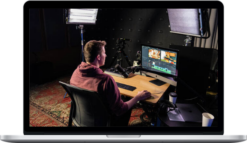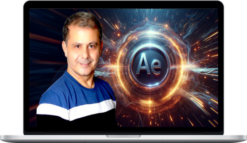MographPlus – Introduction to Interior Visualization with Redshift and Cinema 4d
$89.00 $49.00
» Instant Delivery
MographPlus – Introduction to Interior Visualization with Redshift and Cinema 4d
In this course, you learn how to light, shade and render realistic interior scenes using Cinema 4D and Redshift.
First, you learn how to work with references and how to look at and analyze them, then we start setting up our lights and compare different lighting setups and techniques until we have the most optimized and realistic interior lighting.
Next we learn how essential it is to have a secondary lighting setup for the look dev process; this secondary lighting setup will help us to have a near real-time shader development process without having to suffer the longer render times that comes with difficult interior shots.
Not only you learn the how part of the lighting process but the why part as well, basically why we do what we do, and this would definitely help you in your own projects.
Then we start working on our shaders, we create more than 60 shaders, all kinds of materials, plaster, marble, fabric, wood, plastic, metal, paint, rubber, glass, translucent plastic, parquet, plants, leaves, soil, clay and much more ….
We also talk about more advanced shading techniques like randomizing textures, colors and materials per geometry, this technique could be very useful in complex scenes when you want to avoid repetition when applying the same material to multiple objects, or have very specific and customizable control over the colors and attributes of a set of objects that have the same material.
After we are done with the materials, we start preparing our scene for the final render, we compare the benefits of automatic and custom sampling and finally use custom sampling to setup the final render.
What You’ll Learn In Introduction to Interior Visualization with Redshift and Cinema 4d
- Resources and Project Files
- Section 1 Introduction
- Section 2 Lighting
- Section 3 Shading
- Section 4 Rendering
More courses from the same author: MographPlus
Be the first to review “MographPlus – Introduction to Interior Visualization with Redshift and Cinema 4d” Cancel reply
You must be logged in to post a review.
When will I receive my course?
You will receive a link to download your course immediately or within 1 to 21 days. It depends on the product you buy, so please read the short description of the product carefully before making a purchase.
How is my course delivered?
We share courses through Google Drive, so once your order is complete, you'll receive an invitation to view the course in your email.
To avoid any delay in delivery, please provide an Gmail and enter your email address correctly in the Checkout Page.
In case you submit a wrong email address, please contact us to resend the course to the correct email.
How do I check status of my order?
Please log in to Courseforjob account then go to Order Page. You will find all your orders includes number, date, status and total price.
If the status is Processing: Your course is being uploaded. Please be patient and wait for us to complete your order. If your order has multiple courses and one of them has not been updated with the download link, the status of the order is also Processing.
If the status is Completed: Your course is ready for immediate download. Click "VIEW" to view details and download the course.
Where can I find my course?
Once your order is complete, a link to download the course will automatically be sent to your email.
You can also get the download link by logging into your Courseforjob account then going to Downloads Page.
Related products
Design & Creative
Emil Pakarklis – iPhone Editing Academy – iPhone Photo Masters
Design & Creative
Design & Creative
Design & Creative
Design & Creative
Design & Creative
Design & Creative












Reviews
There are no reviews yet.